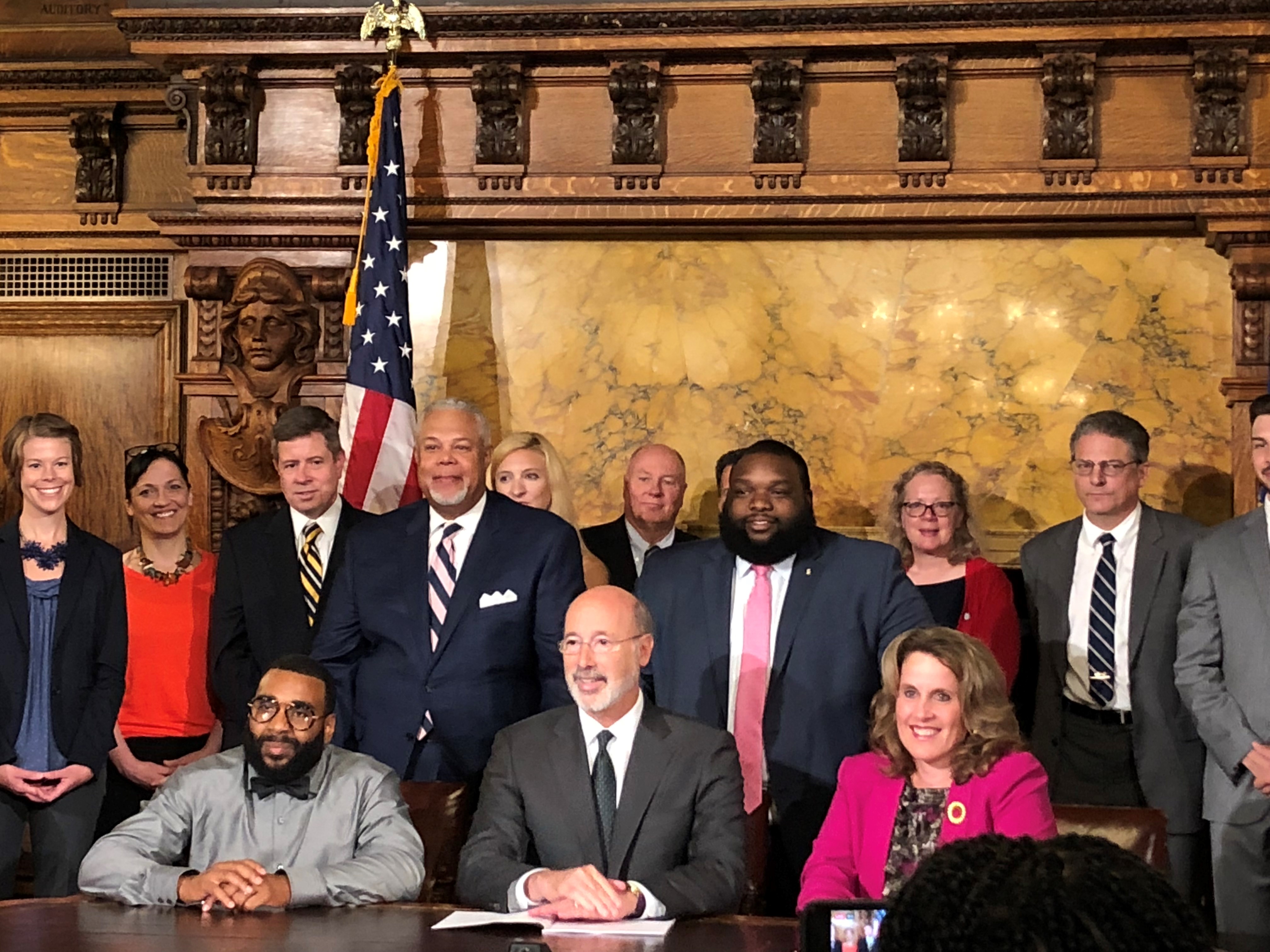Governor Wolf Signs Clean Slate Bill, Calls for More Criminal Justice Reform

Today, Governor Tom Wolf was joined by Representative Sheryl Delozier, Senator Anthony Williams, Representative Jordan Harris and many stakeholder and advocacy groups for the signing of House Bill 1419, the “Clean Slate” bill. The first of its kind in the nation, the bill was co-sponsored by Reps. Delozier and Harris, Sen. Williams sponsored the Senate version of the bill.
“I am proud to sign this legislation, which will make it easier for those who have interacted with the justice system to reduce the stigma they face when looking for employment and housing,” Gov. Wolf said. “Clean Slate passed in an overwhelmingly bi-partisan manner and I want to thank the General Assembly and the many advocates and stakeholders who made this possible.”
“I’m honored to have authored this law, which had almost unanimous support of both Republicans and Democrats in both chambers of the General Assembly,” Delozier said. “People who have been convicted of or pleaded guilty to minor misdemeanors many years ago deserve a second chance. They have shown that they have reformed their lives, and this barrier to employment and housing needs to be removed.”
“With enactment of this clean slate legislation, citizens who have paid their debt to society and proven their rehabilitation can truly re-integrate into their communities, “Senator Anthony Williams said. “I look forward to welcoming these returning citizens to our workplaces and neighborhoods.”
“Clean slate is another example of how we as a commonwealth can chart a new course that effectively addresses the reintegration of our neighbors into society after they have found themselves on the wrong side of the law,” Rep. Jordan Harris said. “Clean Slate will remove one of the many barriers to employment that our citizens face and hopefully assist thousands of Pennsylvanians to reenter the workforce.”
This Clean Slate legislation allows for individuals to petition the courts for their records to be sealed if a person has been free from conviction for 10 years for an offense that resulted in a year or more in prison and has paid all court-ordered financial debts.
Additionally, it allows automatic sealing of records for second or third-degree misdemeanor offenses that included a less than two-year prison sentence if a person has been free from convictions for 10 years, as well as sealing of criminal history records related to charges that resulted in non-convictions.
The legislation does not allow for records-sealing in more serious crimes, such as firearms charges, sexual offenses, murder, kidnapping, child endangerment, and endangering the welfare of children, among other serious offenses.
“This bill is the latest step in my administration’s efforts to make our commonwealth and our society safer by helping those who have offended put their lives back together,” Gov. Wolf said. “Last year, we ‘banned the box,’ removing the criminal conviction question for job applications covered by the Office of Administration, which ensured that all candidates for employment are being evaluated on their merit, and on their willingness and ability to contribute to our commonwealth.
“While Clean Slate and Ban the Box are great steps to removing the stigma of low-level convictions, we also know that we need to do more to reform our criminal justice system,” Gov. Wolf said.
The governor also called for passage of additional criminal justice reforms legislation to include:
- Justice Reinvestment Initiatives (JRI2), which seek to provide for fair sentencing, increase parole supervision and use of community-based programs, among other reforms.
- Bail and Pre-Trial Reforms to ensure that everyone has a right to a fair trial and that risk-assessment tools are consistent across the commonwealth.
- Post-Conviction Relief Act Expansion to reduce time sensitivity by increasing awareness of when rights expire so defendants can make an informed plea decision. Currently if a defendant pleads guilty, they are foreclosed from post-conviction relief; this needs to change so all defendants, regardless of plea, may attempt to prove their innocence.
- Probation/Parole Revocation and Resentencing to create uniformity in probation revocation procedures and ensure a correlation between risk and probation lengths, resulting in better supervision.
- Indigent Defense is a critical part of the system that can have a large impact on volume, cost, and human effects and is needed in Pennsylvania to ensure the independence and quality of counsel under the Sixth Amendment.
- Stepping Up Initiative, which was launched statewide in April 2017 and via summit in December 2017 along with a data-driven project by Dauphin County to examine its criminal justice system, with the goal of reducing the number of people who have serious mental illnesses in the county prison.